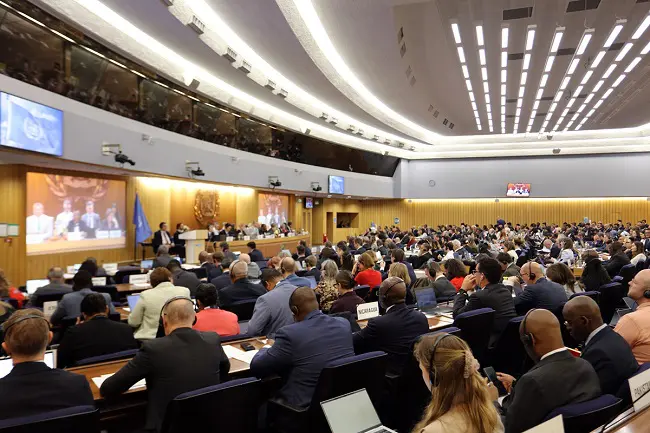By Etienne Mainimo Mengnjo
Diplomats at the United Nations’ International Maritime Organization (IMO) have reached an agreement on the world’s first carbon pricing mechanism targeting the global shipping industry, a significant step towards reducing emissions from one of the world’s major polluting sectors. The commitment was made on April 11 at IMO headquarters in London.

The overall policy is expected to be formally adopted in October 2025, although several technical details are still under discussion. During the closing plenary session, delegates endorsed a global framework that will impose a carbon price on shipping emissions, aimed at facilitating the industry’s decarbonization and promoting the use of cleaner technologies. The policy has garnered support from 63 countries, including Brazil, China, the European Union, South Africa, Kenya, Senegal, and Namibia, setting a global precedent.
Despite opposition from oil-producing nations such as Saudi Arabia, the UAE, Russia, and Venezuela—who criticized both the substance and the process of the agreement—Norway’s compromise proposal, led by the IMO Chair, passed in the final vote.
The voting breakdown showed 63 nations in favor, including the EU, China, India, Japan, South Korea, South Africa, Singapore, Norway, Kenya, Namibia, and Senegal. In contrast, 16 countries voted against the measure, including Saudi Arabia, the UAE, Oman, Algeria, and Morocco, while 25 nations abstained, among them Pacific Island states like Tuvalu, Kiribati, and Fiji, as well as Seychelles, Egypt, Ghana, Liberia, Madagascar, and Uganda.
Starting in 2028, ships will be required to either transition to lower-carbon fuel mixes or pay for their excess emissions. Vessels that continue to use conventional fossil fuels will incur a fee of $380 per tonne on the most intensive portion of their emissions and $100 per tonne on remaining emissions exceeding a specified threshold. The funds generated will be allocated exclusively for decarbonizing the maritime sector, rather than for climate financing in developing countries.
The tax is projected to generate between $30 billion and $40 billion in revenues by 2030, approximately $10 billion annually. However, the agreement is expected to achieve only a 10% reduction in absolute emissions in the shipping sector by 2030, significantly below the IMO’s own target of at least a 20% reduction by that year, with an aspirational goal of 30%.
Notably, the U.S. delegation was absent during the vote, adhering to its stance of not participating in negotiations after previously circulating a text urging delegations to withdraw from discussions.
In 2023, the IMO acknowledged that both economic measures (like carbon pricing) and technical solutions (such as a Global Fuels Standard) are essential to meet its climate commitments: a 20% reduction in emissions by 2030, an 80% reduction by 2040, and achieving net-zero emissions around 2050 in an equitable manner. During technical negotiations from March 31 to April 4, countries advanced a unified policy encompassing both elements. This mechanism was finalized at the MEPC 83 summit from April 7 to 11 and is set for adoption in October, although some aspects, particularly regarding revenue distribution, remain unresolved.
Reaction quotes
“The developing countries with the greatest need came here and offered a solution. How can the other major economies ask us to take a weak deal home to our people, who are suffering as a result of the climate crisis? And how can they take it back to their constituents?” Minister Antony Derjacques of the Seychelles.
“In the end, the best possible outcome was achieved. The shipping industry has taken the lead in showing other hard-to-abate sectors that climate action is possible. African delegations must be commended, including Kenya, Namibia, Senegal, South Africa, and others who rose to the occasion and supported the compromise. Now that the IMO has agreed on measures that would apply on a global level, it is key that the various regional emissions schemes start seriously considering pulling back on their unilateral measures to avoid multiplicity of schemes piling up layer after layer of costs on African consumers,” Maria Ogbugo, Senior Associate, African Future Policies Hub.
“Reaching consensus on decarbonisation measures was bound to be difficult. But what we clearly saw is a consensus outcome that was supported by many nations including African states like Kenya, Senegal, Namibia, and South Africa. What we have now is a measure that still puts a price on the shipping sector’s emissions, which is an important starting point on which more ambition could be further built, without creating shocks on economically vulnerable countries,” Faten Aggad, Executive Director, African Futures Policies Hub.
“A universal carbon levy represents a rare opportunity to transform climate risks into sustainable development investment. Several African delegations demonstrated exceptional leadership in the technical negotiations by connecting the levy directly to critical priorities of food security, climate resilience, and equitable revenue distribution. Maintaining this united approach will be essential as implementation discussions begin,” Eldine Glees, Maritime Policy Advisor at the Micronesian Centre for Sustainable Transport.
“The global carbon pricing scheme agreed today in the IMO is a step forward as it recognises the responsibility of polluters to contribute to climate damages,” Laurence Tubiana, CEO at the European Climate Foundation, and Architect of the Paris Agreement.
“But it is not sufficient. In particular, the lack of a shipping levy is a missed opportunity. We know there is significant public support for levies on polluting, undertaxed industries and the super-rich.“The world needs more international cooperation, not less, and coalitions of the willing will be more important than ever. Together, progressive partners can still achieve vital breakthroughs for climate and development finance.”
Hon. Minister Ralph Regenvanu, Minister of Climate Change Adaptation, Meteorology, Geo-Hazards, Environment, Energy, and Disaster Management of Vanuatu, said: “Let us be clear about who has abandoned 1.5°C. Saudi Arabia, the US and fossil fuel allies pushed down the numbers to an untenable level and blocked progress at every turn. These countries – and others – failed to support a set of measures that would have gotten the shipping industry onto a 1.5°C pathway. And they turned away a proposal for a reliable source of revenue for those of us in dire need of finance to help with climate impacts.”
Ambassador Albon Ishoda, Marshall Islands Special Envoy for Maritime Decarbonization, said: “We are not done. We will be back. Alongside our friends from the Caribbean, the Pacific, Africa, Central America, and the UK. Still standing. Still steering.”







